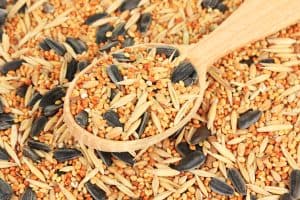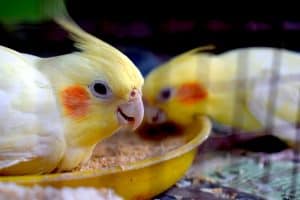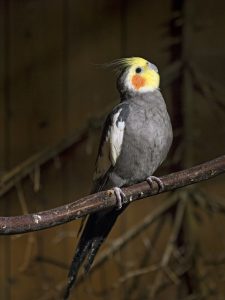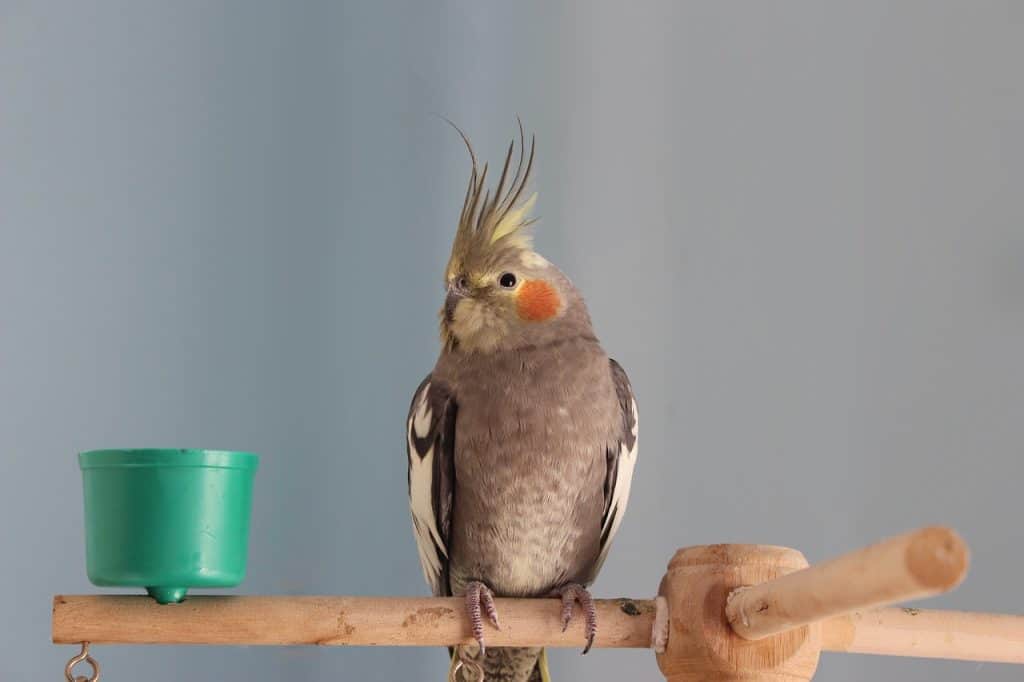As a popular pet bird, it’s essential to understand how long can a cockatiel go without food to ensure their health and happiness. Cockatiels, like most birds, have higher metabolism than other animals, meaning they must eat often to meet their energy needs. In general, a healthy cockatiel should be given enough food on a daily basis to prevent weight loss and potential health problems.
A cockatiel’s diet typically consists of a mixture of bird feed, including pelleted seeds, fresh fruits, and vegetables. An average cockatiel needs to consume about 10% of its body weight in food daily. However, if a cockatiel goes without food for more than a day, they might experience weight loss, body weakness, and a decline in overall health. While it is not advised to let a cockatiel go without food for that long, in some cases, they might survive longer if they have access to fresh water. Water can help maintain a bird’s digestive system, but it cannot replace the nutrients from solid food that the bird needs to stay healthy.
It’s important for pet bird owners to be mindful of their cockatiel’s food intake, as well as the freshness of the food in their bowl. Be sure to provide a variety of fresh food options and monitor their eating habits regularly. If a cockatiel stops eating or appears unwell, it’s crucial to consult with an avian vet immediately to identify any potential health issues and address them as soon as possible.
Understanding a Cockatiel’s Dietary Needs

As a popular pet bird, cockatiels require a balanced and varied diet to stay healthy. Knowing how long can a cockatiel go without food and understanding their dietary needs are essential for all pet bird owners who want their birds to thrive.
Cockatiels typically eat a mix of pelleted seeds, fresh fruits, and vegetables. Most bird feed you’ll find in a pet store should cover the basic nutritional needs of your pet bird, but it’s important to offer fresh food as well. Some healthy options include leafy greens, carrots, and bits of apple.
To ensure that your cockatiel gets all the nutrients it needs, consult an avian vet for expert advice on tailoring their diet. A healthy cockatiel has a good appetite and will consume food throughout the day. As a bird owner, it’s essential to provide your bird with enough food and fresh water at all times.
Birds can go without food for a few hours or even more than a day if absolutely necessary, but starving your bird for long periods is cruel and harmful to its health. Baby cockatiels, or smaller birds in general, are more susceptible to health problems from lack of food, while larger birds might survive longer without food. Nonetheless, healthy cockatiels should have regular access to a food bowl filled with diverse food options to avoid health issues and to ensure they’re eating properly.
An additional aspect to consider is the new environment a cockatiel might encounter. When you first bring your pet bird home, it may stop eating due to stress or unfamiliar surroundings. It’s vital to make sure the cockatiel’s food and water bowls are accessible and visible, and that your bird starts eating within a day or two.
If you find that your cockatiel isn’t eating, take note of its behavior – A sick bird may avoid food, leading to rapid weight loss and severe health problems. Don’t hesitate to consult an avian vet if you believe your cockatiel’s well-being is at risk.
Here’s a quick summary of a healthy cockatiel’s dietary needs:
- Pelleted seeds
- Fresh fruits (e.g., apple)
- Fresh vegetables (e.g., leafy greens, carrots)
- Freshwater
- PREMIUM FORAGING MIX of bell peppers, papayas, pineapples, flax seed and almonds
- HAND-PICKED INGREDIENTS inspired by ancestral feeding habits of Cockatiels
- NATURAL with vitamins and minerals
- NO ADDED FILLERS or artificial preservatives
- PREBIOTICS and PROBIOTICS for digestive health
- OMEGA 3s to support brain and heart health
- VETERINARIAN-RECOMMENDED BRAND with more than 150 years of experience caring for pet birds
Factors Influencing Food Requirements
When considering how long can a cockatiel go without food, it’s important to remember that several factors can affect their food needs. Many elements, such as their age, health status, and environment, can impact a cockatiel’s dietary requirements.
Cockatiel life stages have different food demands. For instance, baby cockatiels require more attention and specific feedings compared to adult birds. They rely on their parents or bird owners to supply them with enough food regularly and may suffer if left without it. Baby cockatiels need proper nutrition to support their growth and development, so they should receive hand feeding or frequent meals.
Adult cockatiels are more independent and can generally manage their food intake. An average cockatiel consumes 10-15% of its body weight in feed each day, mainly in the form of pellets, seeds, fresh fruits, and vegetables. Maintaining a balanced and varied diet allows cockatiels to receive all the nutrients they need for optimal health, and a trip to an avian vet can help ensure your pet reflects a healthy cockatiel.
Health issues in cockatiels can also provide insight into how long they can go without food. Certain illnesses may reduce a cockatiel’s appetite, leading them to stop eating, which may cause weight loss or further health problems. If you notice any changes in your pet’s eating habits, make sure to consult an avian vet to identify potential problems early on and get proper guidance.
The environment plays a role in determining how long can a cockatiel go without food as well. A comfortable and stress-free environment encourages a cockatiel to eat properly. However, moving them to a new environment, such as a pet store or new home, might cause temporary disruptions in their eating schedule, and they may struggle to eat during this adjustment period.
The type of food you provide will affect the eating habits and nutritional needs of your pet bird. High-quality bird feed with a combination of pellets, seeds, fresh vegetables, and fruits is necessary for a balanced diet. Ensure their food bowl is clean and always stocked with a variety of fresh food options. Also, don’t forget to provide them with a freshwater source, as proper hydration is essential for their overall well-being.
Most cockatiels, like other pet birds or smaller parrots, cannot survive extended periods without food. Going more than a day without a meal can raise chances of health issues for a cockatiel. Maintaining a stable meal schedule and understanding the specific needs of your pet will keep your cockatiel happy and healthy.
Remember that each bird is unique and that monitoring your cockatiel’s food intake, health, and environment regularly can better inform you on what’s best for them. Be attentive to their needs so that your beloved pet bird thrives and stays healthy for years to come.
Typical Cockatiel Feeding Patterns

As a popular pet bird, understanding a cockatiel’s feeding patterns is essential for pet owners. A healthy cockatiel has a diverse diet, including a mix of pellets, seeds, fresh vegetables, and fresh fruits. Ensuring that these pet birds receive all the nutrients they need is crucial in maintaining their health and happiness.
On average, a cockatiel will require a daily food intake of about 30-40 grams. However, this can vary depending on factors such as size, age, and activity level. It’s important for bird owners to monitor their cockatiel’s food intake and to adjust the amount of food provided according to their needs.
Cockatiels, like most parrots, will usually eat twice a day: once in the morning and once in the evening. Small birds like cockatiels have faster metabolisms than larger birds, which requires them to consume enough food to maintain their energy levels throughout the day. It’s important to ensure access to fresh food and water for your pet bird, regularly cleaning both the food bowl and water bowls to maintain hygiene.
Baby cockatiels have a different feeding pattern than adult birds. Hand feeding with a syringe or spoon may be necessary to ensure they receive the proper nutrition. Typically, baby cockatiels need to be fed every few hours.
A common question among bird owners is, “how long can a cockatiel go without food?” The answer varies, but in general, cockatiels can survive without food for up to 24 hours. But, remember that this is the absolute maximum limit; it’s not wise to let birds starve for more than a few hours. An extended period without food will lead to weight loss, health problems, and weak immune systems.
It’s crucial to be aware of the signs your cockatiel may not be eating properly. If you notice your bird has stopped eating or appears lethargic, consult an avian vet immediately. Lack of appetite could be due to health issues, poor diet, or the bird adjusting to a new environment. In any case, swift action is essential to prevent a sick bird’s condition from worsening.
Potential Risks of Food Deprivation

To give a general idea, as pet birds, cockatiels can typically survive for around 24 to 48 hours without food. However, this isn’t a rule set in stone, and it’s crucial to understand the potential risks involved when a cockatiel goes without food for more than a day.
There are several health problems that may arise from food deprivation in cockatiels. A few of these include:
- Weight loss: Going without food for extended periods can lead to a significant drop in body weight, which can be detrimental to a healthy cockatiel. This is especially concerning for baby cockatiels, given their smaller body size and higher nutrient requirements.
- Poor overall health: A poor diet or lack of proper nutrients is the primary cause of many health issues in birds. If your cockatiel’s food situation isn’t optimal, it can lead to complications and general unhappiness for your pet.
Food deprivation isn’t the only issue pet owners should be aware of. Often, bird owners might not be providing the correct balance of nutrition in their cockatiel’s diet. Pet store bird feed may not have all the nutrients a cockatiel requires, so additional fresh fruits and vegetables should be included in their meals. Here are some quick tips to ensure your pet bird gets enough food:
- Offer a variety of food: Most birds, including cockatiels, appreciate having a mix of fresh food on their plate. Be sure to offer fresh fruits, fresh vegetables, and pelleted seeds to maintain a balanced diet.
- Monitor the food bowl: Keep an eye on your cockatiel’s food bowl to make sure it’s consuming its food and water at an appropriate pace. If it’s emptying the bowl too quickly, you might need to offer more food.
When it comes down to it, the key to a happy and healthy cockatiel is ensuring it’s eating properly and in an environment that allows it to stay healthy. A well-rounded diet is vital for good digestion and maintaining a strong immune system. If you notice your cockatiel isn’t eating or seems unwell, consult an avian vet as soon as possible.
Final Thoughts
Understanding a cockatiel’s dietary needs and feeding patterns is essential for maintaining their health and happiness. As a bird owner, providing a well-balanced diet, fresh water, and a stress-free environment is crucial for your pet’s well-being. Be mindful of your cockatiel’s food intake and the freshness of the food, as well as their behavior and overall health. Consult an avian vet for expert advice on dietary requirements and addressing any potential health issues. By paying close attention to your pet bird’s needs, you can ensure their happiness and health for years to come.
- How Can Your Other Pets Be Harmful To Your Cockatiel
- How Cockatiels Show Affection
- How Do Children Make Cockatiels As Pets
- How Do Cockatiels See
- How Do Cockatiels Sleep
- How Do Fumes Affect Your Cockatiel
- How Do You Care For Your Cockatiel Everyday
- How Do You Choose A Cage For Your Cockatiel
- How Do You Medicate Cockatiels
- How Do You Provide Your Cockatiel With Water
- How Do You Select Your Cockatiel
- How Do You Tame A Cockatiel
- How Does A Cockatiel Got Her Name
- How Far Can A Cockatiel Fly
- How Far Can A Cockatiel See
- How Fast Can Cockatiels Fly
- How Good Is A Cockatiels Memory
- How Long Can A Cockatiel Go Without Food
- How Long Can Cockatiels Go Without Water
- How Long Do Cockatiels Actually Live For In Captivity
- How Long Do Cockatiels Live In Captivity
- How Long Does It Take For Clipped Wings To Grow Back
- How Long Does It Take For Cockatiel Tail Feathers To Grow Back
- How Long Should A Cockatiel Be Out Of Its Cage
- How Often Do Cockatiels Lay Eggs
- How Often Do Cockatiels Poop
- How Often Should A Cockatiel Go To The Vet
- How Should I Set Up My Cockatiels Cage
- How To Bathe Your Cockatiel
- How To Bird Proof A Room
- How To Bond Two Cockatiels
- How To Bond With A Scared Cockatiel
- How To Build Trust With A New Cockatiel
- How To Calm A Stressed Cockatiel
- How To Care For Your Cockatiels Health
- How To Care For Your Cockatiels Nails
- How To Catch A Cockatiel
- How To Clean Cockatiel Nose
- How To Clip A Cockatiels Nails
- How To Discipline A Cockatiel
- How To Find A Cockatiel That Flew Away
- How To Get A Cockatiel Back Into Its Cage
- How To Get A Cockatiel To Go On Your Hand
- How To Get A Cockatiel To Like You
- How To Get A Cockatiel To Sit On Your Finger
- How To Give Your Cockatiel Exercise
- How To Grow Millet For Cockatiels
- How To Hold A Cockatiel
- How To Introduce A New Cockatiel To Another
- How To Keep A Cockatiel Quiet
- How To Keep A Cockatiel Warm 10 Tips And Tricks
- How To Maintain A Clean Cockatiel Cage
- How To Make Your New Cockatiel Feel At Home
- How To Manage Multiple Cockatiels In One Household
- How To Monitor Your Cockatiels Health
- How To Prepare Your Cockatiel For Travel
- How To Prevent Your Cockatiel From Becoming Stressed
- How To Recognize And Treat Cockatiel Anxiety
- How To Take Care Of An Older Cockatiel
- How To Tame A Cockatiel That Bites
- How To Tame Your Cockatiel
- How To Teach A Cockatiel To Talk
- How To Tell If A Cockatiel Is In Pain
- How To Tell The Age Of A Cockatiel
- How To Toilet Train Your Cockatiel
- How To Train A Cockatiel To Fly To You 8 Steps
- How To Train A Cockatiel To Poop In One Place
- How To Train Naughty Cockatiels
- How To Transition Your Cockatiel To A New Cage
- How To Transport A Cockatiel To The Vet
- How To Trim A Cockatiels Beak
- How To Trim Your Cockatiels Wings




